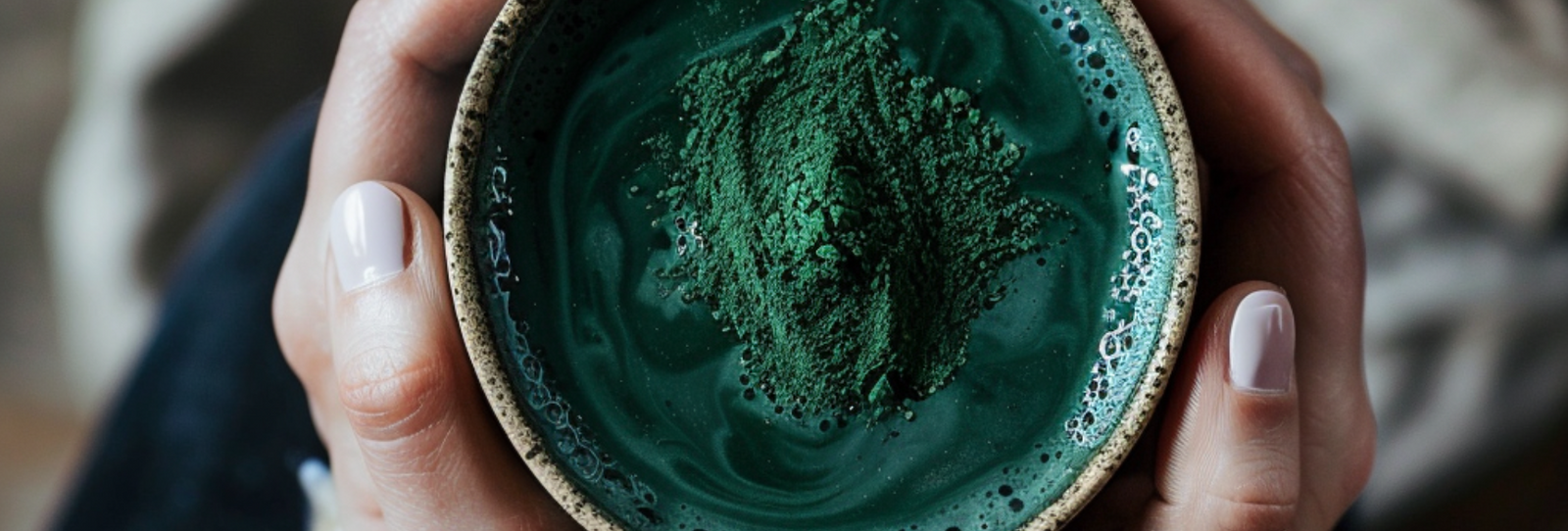
by Erika Albertini, PT, DPT August 02, 2024 6 min read
Hey there, health enthusiasts! Have you heard about Spirulina? This little green wonder has been making waves in the wellness community, and for good reason. Spirulina is a type of blue-green algae often touted as a "superfood" due to its impressive nutritional content and potential health benefits. Let’s dive into the fantastic world of Spirulina and see what makes it so unique.
Spirulina is a type of cyanobacteria that grows in both fresh and saltwater environments. Historically, it has been harvested from natural lakes and ponds, particularly in regions like Africa, Asia, and Central America. Today, Spirulina is cultivated worldwide in controlled environments to ensure purity and consistency. Its cultivation involves growing the algae in large, shallow ponds, where it is harvested, dried, and processed into powder or tablet form.
Spirulina is renowned for its impressive nutritional profile and health benefits. Here are some of the key benefits supported by research:
Spirulina is a powerhouse of essential nutrients, including protein, vitamins B1, B2, B3, copper, iron, and magnesium. Just a single tablespoon (7 grams) of dried Spirulina powder contains:
Spirulina’s primary active compound, phycocyanin, gives it its unique blue-green color. Phycocyanin has impressive antioxidant and anti-inflammatory effects, helping fight oxidative stress and inflammation. This can support your body in various ways, from enhancing immune function to reducing the risk of chronic diseases (Fernández-Rojas et al., 2014; Romay et al., 2003).
Spirulina can also work wonders for your heart. Studies have shown that it may help:
These factors contribute to better heart health and lower the risk of cardiovascular disease (Far et al., 2021).
Spirulina is good not only for your body but also for your brain. Research suggests it can improve various aspects of brain health and protect against neurodegenerative diseases. This is largely due to its high concentration of antioxidants and anti-inflammatory compounds that help protect brain cells from damage (Trotta et al., 2022).
With its rich nutrient and antioxidant profile, Spirulina can enhance immune function. It helps bolster your body’s defenses, potentially protecting against infections and illnesses. Studies have shown that Spirulina can enhance immune function by increasing the production of antibodies and infection-fighting proteins (Finamore et al., 2017)
If you’re into fitness, Spirulina might become your new best friend. Its high protein content and essential amino acids help build and repair muscles, improving strength and endurance (Calella et al., 2022).

Studies show Spirulina is a win for your workouts.
Some studies suggest that Spirulina may help regulate blood sugar levels, making it particularly beneficial for individuals with diabetes. It can help manage glucose levels and improve overall metabolic health.
Spirulina’s nutrient-rich profile also supports the body’s natural detoxification processes. It helps flush out toxins and keep the system clean and healthy. Research indicates that Spirulina can help detoxify the body from heavy metals, particularly arsenic, making it a valuable tool for people exposed to contaminated water sources (Belay et al., 1993).
Feeling sluggish? Spirulina can give you a natural energy boost. Its combination of vitamins, minerals, and antioxidants helps combat fatigue and increase vitality.
While Spirulina is generally safe for most people, there are a few exceptions:
People with Autoimmune Disorders: Spirulina can bolster the immune system, which may exacerbate autoimmune conditions like asthma, multiple sclerosis, and lupus.
Allergies and Phenylketonuria (PKU): People with allergies to shellfish, seafood, or iodine should avoid spirulina, as it contains phenylalanine. And folks with the rare metabolic condition PKU cannot metabolize the amino acid phenylalanine. Therefore, if you have PKU, it's best to check with your doctor before consuming Spirulina supplements.
Pregnant or Breastfeeding Individuals: It’s best to consult with a doctor before taking Spirulina during pregnancy or breastfeeding.
Blood Thinners and Bleeding Disorders: If you take blood thinners or have a bleeding disorder, Spirulina might not be suitable for you.
There are various ways to incorporate Spirulina into your diet:
Super Greens Powders: These powders often contain Spirulina along with other nutrient-dense greens. Just mix it with water or your favorite juice for a quick nutrient boost.
Green Juice: Add Spirulina to your homemade green juice for an extra punch of nutrients.
Smoothies: Blend Spirulina powder or your super greens powder into your morning smoothie. Get creative with recipesand never get bored.
Sprinkling on Foods: Sprinkle Spirulina powder on salads, soups, or even oatmeal.

Convenient and tasty way to get your daily dose of Spirulina.
Spirulina is a nutritional powerhouse with numerous health benefits. From supporting heart and brain health to boosting immunity and energy levels, it’s no wonder Spirulina is considered a superfood. However, it’s always best to consult with a healthcare professional before adding any new supplement to your diet.
So, if you’re looking for a natural way to enhance your health, why not give Spirulina a try? Whether you mix it into your smoothies, sprinkle it on your salads, or add it to your super greens powder, Spirulina might just be the green boost you need.
Spirulina is a type of blue-green algae that has gained popularity as a superfood due to its dense nutritional profile. It is rich in proteins, vitamins, minerals, and antioxidants. A single tablespoon of Spirulina powder provides essential nutrients such as protein, vitamins B1, B2, B3, copper, and iron, making it a powerhouse of health benefits.
Spirulina supports heart health by helping to lower total cholesterol, reduce LDL (bad) cholesterol, decrease triglycerides, and increase HDL (good) cholesterol. These effects contribute to better cardiovascular health and reduce the risk of heart disease. Regular consumption of Spirulina can help maintain a healthy heart and vascular system.
Yes, Spirulina can enhance immune function thanks to its rich nutrient and antioxidant profile. It helps bolster the body's defenses by providing essential vitamins and minerals that support the immune system. Regular intake of Spirulina may help protect against infections and illnesses, keeping your immune system strong and responsive.
Spirulina is beneficial for brain health due to its high concentration of antioxidants and anti-inflammatory compounds. These properties help protect brain cells from damage and improve various aspects of cognitive function. Research suggests that Spirulina may help prevent neurodegenerative diseases and enhance overall brain health.
While Spirulina is generally safe for most people, certain individuals should avoid it. Those with autoimmune disorders, allergies to shellfish, seafood, or iodine, and people with phenylketonuria (PKU) should steer clear of Spirulina. Pregnant or breastfeeding individuals and those on blood thinners or with bleeding disorders should consult with a healthcare professional before adding Spirulina to their diet to ensure it's safe for them.
Fernández-Rojas, B., Hernandez-Juarez, J., & Pedraza-Chaverri, J. (2014). Nutraceutical properties of phycocyanin. Journal of Functional Foods, 11, 375-392.
Romay, C., González, R., Ledón, N., Remirez, D., & Rimbau, V. (2003).C-phycocyanin: a biliprotein with antioxidant, anti-inflammatory and neuroprotective effects. Current protein & peptide science, 4 3, 207-16.
Far, Z., Babajafari, S., Kojuri, J., Mohammadi, S., Nouri, M., Rostamizadeh, P., Rahmani, M., Azadian, M., Ashrafi‐Dehkordi, E., Zareifard, A., Vafa, R., & Mazloomi, S. (2021).Antihypertensive and antihyperlipemic of spirulina (Arthrospira platensis) sauce on patients with hypertension: A randomized triple‐blind placebo‐controlled clinical trial.Phytotherapy Research, 35, 6181 - 6190.
Finamore, A., Palmery, M., Bensehaila, S., & Peluso, I. (2017).Antioxidant, Immunomodulating, and Microbial-Modulating Activities of the Sustainable and Ecofriendly Spirulina. Oxidative Medicine and Cellular Longevity, 2017. https://doi.org/10.1155/2017/3247528.
Trotta, T., Porro, C., Cianciulli, A., & Panaro, M. (2022). Beneficial Effects of Spirulina Consumption on Brain Health.Nutrients, 14.
Belay, A., Ota, Y., Miyakawa, K., & Shimamatsu, H. (1993).Current knowledge on potential health benefits of Spirulina. Journal of Applied Phycology, 5, 235-241.
Calella, P., Cerullo, G., Dio, M., Liguori, F., Onofrio, V., Gallé, F., & Liguori, G. (2022).Antioxidant, anti-inflammatory and immunomodulatory effects of spirulina in exercise and sport: A systematic review. Frontiers in Nutrition, 9.
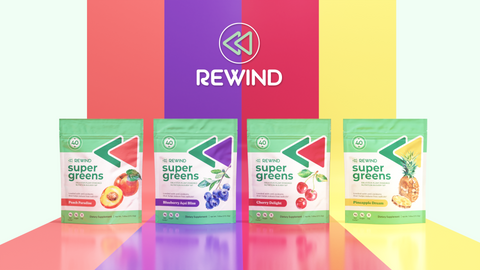
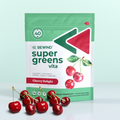
Cherry Delight Vita
$49.99
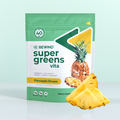
Pineapple Dream Vita
$49.99
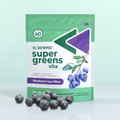
Blueberry Acai Bliss Vita
$49.99